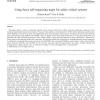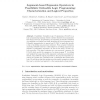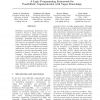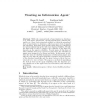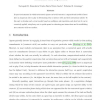65 search results - page 7 / 13 » Fuzzy Argumentation for Trust |
SAFECOMP
2004
Springer
14 years 1 months ago
2004
Springer
This paper defines a type of constrained artificial neural network (ANN) that enables analytical certification arguments whilst retaining valuable performance characteristics. ...
ECSQARU
2005
Springer
14 years 1 months ago
2005
Springer
Possibilistic Defeasible Logic Programming (P-DeLP) is a logic programming language which combines features from argumentation theory and logic programming, incorporating as well t...
UAI
2004
13 years 9 months ago
2004
Defeasible argumentation frameworks have evolved to become a sound setting to formalize commonsense, qualitative reasoning from incomplete and potentially inconsistent knowledge. ...
RSCTC
1993
Springer
13 years 11 months ago
1993
Springer
: While the common kinds of uncertainties in databases (e.g., null values, disjunction, corrupt/missing data, domain mismatch, etc.) have been extensively studied, a relatively une...
AAI
2004
13 years 7 months ago
2004
In open environments in which autonomous agents can break contracts, computational models of trust have an important role to play in determining who to interact with and how inter...
